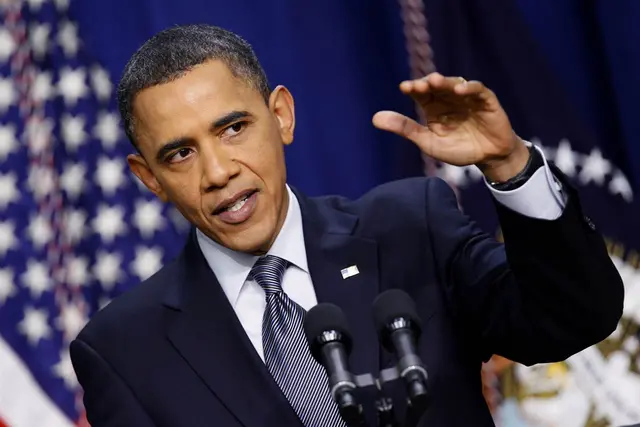U.S. President Barack Obama spent the final hours of his visit to Britain Saturday with a visit to the Shakespearean Globe Theater in London.
Like millions of people around the world, Obama was commemorating the 400th anniversary of the Bard's death.
And in modern Shakespearean speak, there was a new poser about Obama's sensational intervention in Britain's EU referendum debate.
To speak or not to speak ... that is the question?
The reality is there is no correct answer to the question. Campaigners wanting Britain to exit Europe bitterly attacked Obama' s intervention accusing him of meddling in the domestic affairs of a sovereign nation. Whether they would have been as critical had he cried Leave the EU, is yet another question.
In the event Obama's support for Britain remaining as part of the current group of 28, was music to the ears of the Stay campaign.
Experts in Britain specializing in American and European politics have no qualms about Obama having his say.
What will happen to the so-called special relationship once the dust settles on his Friday "back of the queue" speech, remains to be seen.
Richard Caplan, professor of International Relations in the Department of Politics and International Relations at the University of Oxford, told Xinhua: "Obama and the U.S. leadership generally view the EU as a very successful project which, by promoting integration, has helped to keep peace in the region."
The UK is one of America's closest allies and its shared interests with the UK are better served by the UK in rather than out of the EU, in Obama's view. The UK will remain important to the United States whatever the outcome of the referendum but the importance of the "special relationship" will no doubt be diminished by America's "separate relationship" with Brussels.
There was a similar message from Assistant Professor Thomas Sampson from the London School of Economics.
He told Xinhua: "Obama's visit was designed to demonstrate the U.S. believes it is important for the UK to remain part of the EU. EU membership not only brings economic benefits to the UK, but also gives the UK a voice in shaping the future of the EU. Brexit would weaken the UK's influence over world affairs and the U.S. government does not want that to happen."
Dr Michael Holmes, senior lecturer in European Politics at Liverpool Hope University, told Xinhua: "Obama chose to visit Britain and offer support for UK remaining. He would not be making such statements and pronouncements if it had not been discussed and approved with the UK government."
Looking at the impact of the result on U.S.-UK relations, Holmes said: "Immediately and directly, it would not have much impact. If Britain votes to remain in the EU, then U.S.-UK relations will be unchanged."
"But the current U.S. government is worried about two things. Firstly, if it has to choose between the EU and Britain, the EU is the bigger and more important entity, with plenty of close U.S. allies in it. It wouldn't become an enemy of the UK, but the UK would simply be less of a priority," said the expert.
"Secondly is the general concern that any uncertainty, any sudden shocks are not good for the global economic situation, which is very insecure and vulnerable at present," Holmes added.
"There is a clear hope that he will strengthen the Remain camp. Whether he succeeds or not, we'll know at the end of June. It is an important strategy for the Remain campaign to show important international voices agree with them, but they also have to be very careful that it doesn't come across as an outsider interfering in UK affairs," Holmes said.
On the implications for the special relationship between the UK and the United States, Holmes commented that the relationship is already a "bit more of a specious relationship".
"It is asymmetric -- the UK needs the U.S. more than vice versa. But the U.S. has a real interest in seeing peace and cooperation in Europe. They might not agree with everything the EU does (indeed, there are regular EU-U.S. trade disputes), but they want a stable, democratic, peaceful Europe, and they see the EU as one very important means of promoting such stability, peace and democracy," Homes told Xinhua.
Dr Michael Hopkins, senior lecturer in American Foreign Policy at the University of Liverpool, said it is difficult to know how Obama's timely visit to the UK came about.
"We don't know whether he was encouraged to say what he said, but supporters of Britain staying in the EU have been looking at getting support from as many prominent people and organizations as possible," Hopkins told Xinhua.
"In effect this is something the Americans are entitled to have an opinion about because of their involvement over many years in Britain and Europe. It is a continuation of a long trend that started in the 1940s," Hopkins said.
"I don't think the special relationship between Britain and the U.S. is as significant as it used to be. The really important thing about the special relationship is what goes on beneath at a different level than that of national leaders," Hopkins added.
Hopkins concluded: "It is hard to say whether Obama's intervention will influence or convince people how to decide in the referendum."
Opinion polls over the next few days and weeks will show the impact of Obama's intervention. His words, and his warnings, could convince people to vote to stay in the EU. It could also easily backfire, with people voting Leave as a punishment to Obama.
Britain will hold a referendum on June 23 to decide whether it should remain in the EU.
 简体中文
简体中文





